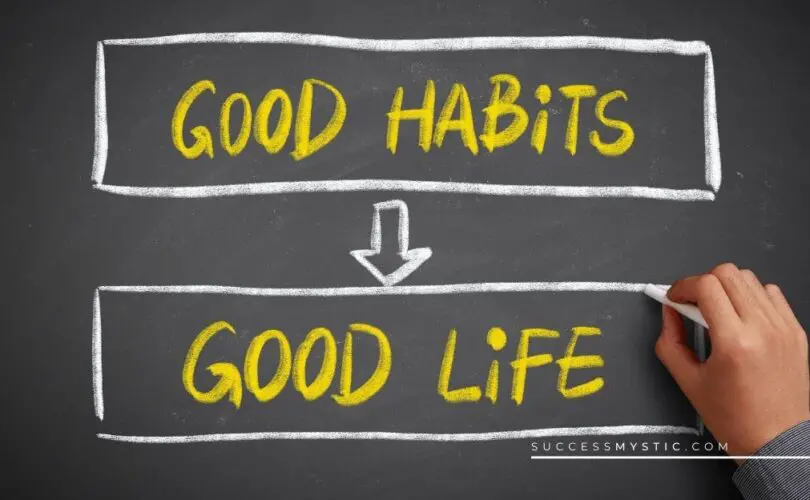The New Year is typically seen as an opportunity to effect change. It’s your chance to wipe the slate clean and make positive changes to improve yourself and your life.
Typically, we resolve to change our bad habits. We are tired of always being tired or stressed so, we take steps that we feel will help improve that. Unfortunately, we often reach a point where we excuse those bad habits.
We give up on change because it’s easier to keep living as we’re living. It might be easier, but the long-term impact isn’t easy. It’s a harder row to hoe, but you still hoe it because it’s the habit that you have created for yourself.
The truth of the matter is, bad habits are guilty of holding you back from achieving your goals and they interrupt your life. Which means that not only do bad habits waste your energy, and your time, but they also jeopardize your physical and mental health.
So, why is it that we struggle so much with shifting these bad habits? Perhaps more importantly, what can you do about it?
The Cause of Bad Habits
What is it that triggers a bad habit? There may be a wide range of reasons for your bad habit. Typically, though, we can boil it down to two major reasons: boredom and stress.
We face a lot of stress in life, whether you’re a stay at home mom, a doctor, retail manager or the CEO of a Fortune 500 company. We all have different ways of coping with that stress. You may be a smoker, and in times of extreme stress, your cigarette intake sharply increases.
It could be that you turn to food for comfort, and it’s never the healthy option, is it? Regardless of the habit itself, you can’t drop it until you understand what is triggering it.
Of course, you may also find that boredom or stress are the outward symptoms of a deeper issuer. This can be difficult to tackle because not everyone is ready to be radically honest with themselves.
It might be that there’s something deeper going on, a belief that you hold, fear of something or an event that is causing an issue. You can’t overcome your bad habits until you realize the cause of them.
Don’t Eliminate, Replace
All of your habits exist for a reason. Some of them will be good habits that provide you with benefits. However, the bad ones… well, they aren’t. Though, you may feel that they are. For example, you pick up a cigarette to relieve a bit of stress. It works.
You have an immediate physiological response and carry on with your day. There’s just a slight problem with that, though. The response is only temporary, smoking actually increases your stress because the craving you quenched will come back. Which means you’re going to get antsy and stressed out until you get another fix.
It may be that your bad habit provides you with some type of emotional benefit. For example, you’re in a relationship that is bad for you but, sometimes it makes you feel good. It doesn’t change the fact that it’s bad for you, you just trick yourself into believing it’s not a bad habit because… well, there are benefits.
Then, there are the bad habits that come as a response to stress – you bite your nails, grind your teeth, clench your jaw, tap your fingers or shake your leg. Or, the boredom that results in repeatedly opening your social media accounts, email or prevents you from tearing yourself away from the latest streaming show.
It’s all overwhelming. It’s all impacting your productivity and dividing your attention. So, those benefits that you convince yourself come with your bad habits – that is what makes it so difficult to purge them from your life. This is why the advice of just stop is rarely enough to be of help. Instead, it’s important that you replace each bad habit with a new, positive habit.
It should be a habit that provides you with benefits similar to your bad habit. For example, you turn to cigarettes to relieve stress.
When you quit you need to practice a new behavior to compensate for your loss. There are healthier behaviors to managing stress than smoking. You can’t cut out the bad habit without meeting the needs that it was feeding.
We have all been in a position where we’ve allowed out commitment to changing fade as time goes by. Change is terrifying, it can be scarier than the consequences of not changing. Perhaps the best example of this is the fact that 90% of coronary bypass surgery patients don’t make changes in their lifestyle despite being near death (ref.). That doesn’t mean that you can’t.
It’s Just Biology
Our habits are formed through our thought patterns. These thought patterns contribute to the creation of memories and neural pathways. Eventually, these become your default behaviors. It’s only human to seek pleasure rather than pain. Abstaining from your bad habits tends to lean on the side of pain… which makes you more likely to fight for your right to feel good.
It’s necessary to change your thought patterns so that you can create new neural pathways. This will offer you the same reward as the bad habit previously did. Yes, that is much easier said than actually done. There will be a stage of discomfort in the initial stages of the process.
The bottom line is that you recognize that you will want to hold onto the comfort of your bad habits. Moreover, that the key to making positive changes is self-awareness.
Gains Over Losses
It often hurts more to lose than it feels good to gain. For example, it feels great to find or gain 50 dollars, but it feels much more painful to lose the same. Which means that when you’re looking to change your habits you fight the urge to lose because that’s what it feels like.
Even when you know that the gain is greater. You need to change your thinking and start focusing on what you gain by changing your habits, rather than get tied up in the belief that you are losing something by stopping a bad habit.
We don’t really stop behaviors, rather, we learn. So, stop saying you need to stop smoking, instead, start looking at it as learning how to manage stress in a healthy way. Instead of saying you need to stop spending, instead, look at it as gaining financial freedom by learning how to be more flexible financially. You’d be surprised at how effective it can be to reframe your thoughts and mindset.
Thinking in Steps
It’s much more difficult to purge your bad habits and change them when you create big steps for yourself to follow. Ultimately, this will negatively impact your ability to achieve your new, positive habit. Likewise, the same can be said for very small steps that are too easy to accomplish.
When we anticipate the achievement of a goal our systolic blood pressure spikes. When the goal is too great it throws a wrench into your ability to achieve, you end up filing it in a drawer that you will never open again.
You can overcome this. The first step is to create an action plan. You can break down your new habits into smaller, attainable milestones. It’s important to tap into your tendencies, both psychological and physiological, to ensure your changes stick. Then, you need to establish cues that will help you reach that goal.
Those cues may be centered around other people, your emotional state, a specific time or location. The cue is what precedes the action of your habit, whether it’s a good one or a bad one.
Your cues can help you solidify your good habits. So, if you know that you crave a cigarette every morning on your way to work, then you need to find a good habit to replace it with.
The Finish Line
There is something to be said for focus and it really is necessary to change your bad habits. The goal will appear much closer if you remain focused than if you allow distraction to creep in. Perception really is everything and the process will feel much easier if you are able to visualize your finish line as being closer than it is in reality. The goal will seem further away the more you allow distractions.
Your habits are formed on the stories that you tell yourself about yourself. So, it’s time to check in with the story that you’ve been writing about yourself.
Do you write yourself in a supporting role? Are you the hero or the antagonist? Are you a victim who always gets the short end of the stick or the person who always comes up roses?
Before you can change your habits, you need to believe that you are capable of making those changes. You can start by cultivating your growth mindset. Start looking at yourself as a work in progress. This will help you create a foundation for creating change.
When it comes to changing habits and making positive habits, you need to reframe yourself as the hero who is focused, on track, and capable of visualizing the finish line. You need to believe that you are completely capable of being whoever or whatever you want to be.
Changing Your Habits
A Substitute
You need to be prepared to respond to positively to the issues that trigger your bad habit. So, when you get the urge to do x, what is it that you’re going to do instead? When social media is whispering your name, how are you going to respond? Know exactly what good habit you are going to practice instead of indulging your bad habit.
Reduce Triggers
Learn how to temper your triggers. For example, if you are giving up cigarettes and you know fine well that you crave them while you drink alcohol – reduce your alcohol intake. If you know you can’t resist the call of cookies, don’t keep cookies in the house. If you immediately turn the television on when you sit down, move the remote control to make it harder on yourself to indulge your bad habits. Or, reframe that thought by thinking of it as making it easier to break those bad habits. Right now, you probably make it easy to indulge bad habits and difficult to practice positive ones. You need to flip the script.
Joint Forces
you can either choose an accountability partner to help you stay on track or join with someone else who wants to break a similar habit pattern. Choose someone that you know will help you remain strong, rather than someone who will drag you down with them. You can celebrate together, hold the other accountable, and find motivation in knowing that someone else is counting on you.
Positive Surroundings
there is power in making new positive friendships. It doesn’t mean that you need to cut out your old friends. It just means that you should feel compelled to surround yourself with friends who are already living how you want to.
Visualize Success
imagine yourself as a non-smoker, an early riser or a healthy eater. See yourself crushing the bad habit and replacing it with a positive one.
You’re Still You
you don’t need to see reinvention as becoming a new person. Instead, you may want to see it as a reset. When you change your bad habits, you’re returning to your default setting and really, becoming the person you always were.
But
when you find negative thoughts or self-talk creeping in, correct it with a but. So, if your brain is telling you that you’re fat add a but and finish the sentence with a positive like I can lose weight.
7 Tips To Stay On Track
- Get started with a specific, easy habit. For example, it could be having breakfast, flossing or going to bed at a specific time. These are easier habits to get started with and it places the focus on building healthy habits, instead of putting the focus on changing your bad habit. You can also ride the wave of motivation that comes from tackling an easier change.
- Don’t change everything all at once. It doesn’t matter how simple you might think it is, you should focus on one habit at a time.
- Ensure that you’re serious about your change in habits – you need to be invested to make it stick. The habit needs to be an important change and one that you’re truly committed to. Gee up your motivation by making a list of the benefits you will experience by cutting out the bad habit, as well as the positive habits you will adopt instead.
- Place visual cues in places you will definitely see. It could be that you leave the floss right next to your toothbrush. It might be that you set a yoga mat by the television. Whatever will work and help you stay on track.
- Always practice your new habit at the same time each day. Don’t allow yourself to delay it, it’s all about enforcing the new routine.
- When negative thoughts arise, replace them with positive ones.
- Your support network can help you stay focused. Tell people why you want to make the change and let them help you through it.
4 Key Habits To Change
If you know that there are changes you want to make, but you just aren’t sure where to start, then let’s take a look at the most common bad habits people want to change. Some of these may resonate you or they may spark something else within you.
Think long and hard about what habits are holding you back and how you can replace them with something more positive in the New Year.
- Diet – you might think you’re doing okay. It’s not like you live on instant noodles and instant coffee like you did in college, right? Maybe not… but there’s a good chance that you’re not far off. You might think your diet is totally okay simply because you’re not overweight. Well, aside from the fact that it will catch up with you eventually, just because your weight is fine doesn’t mean your health is okay. It’s so important that you enjoy a well-balanced diet, which means plenty of fruits and vegetables, lean proteins, whole grains, and proper hydration. It won’t just help you maintain your health and weight, it will make a difference to your sleep, mood, and performance.
- Procrastination – are you always leaving things to the last minute? It probably doesn’t matter how many times you have barely met a deadline, you keep doing it because you work better under pressure… right? It’s time to get organized, and purging procrastination is a great place to start in the New Year. It’s one of the best ways to manage your stress levels and boost your performance.
- Alcohol Consumption – it might have been cool to do in college (to be clear: it wasn’t), but getting drunk makes your body work much harder than it needs to. Consider how often you drink and how much you consume when you do drink. If you often wake up hungover, then it’s time to reassess your habits. It’s one thing to enjoy a glass or two of wine, but if you’re consuming an entire bottle in one sitting and do so multiple times a week, you’re pushing your body too hard.
- Sleep Routine – are you someone who brags about how little sleep you get? “I get three, four hours sleep a night tops and it keeps me on top of my game.” You’re fooling yourself, increasing your stress levels, and risking your overall health and wellness. A lack of sleep has negative effects on both your physical and mental health. You might think that you need to stay up all night to hit a deadline, but your work will suffer as sleep deprivation kicks in.
Final Thoughts
When you sell yourself on the idea of changing your bad habits, then you put yourself in a difficult position. Instead, change your thought process and see it as establishing new, good habits. This is a good step to take to establish a positive mindset. Changing your bad habits is about growth and it’s much easier to grow when you think of it as setting new habits.
You’re not quitting smoking, you’re living your natural life as a non-smoker. You aren’t trying to lose weight, you’re changing your diet to support a healthy lifestyle. It’s these small changes in your mindset that can help you achieve the success that you want to in life.
It doesn’t matter whether these habits impact your social life, career or your relationships. We are all guilty of indulging in bad habits that negatively impact us, whether it’s physically, emotionally or psychologically.
So, what bad habits have you been propping up in your life?
What would you like to replace them with?
Think long and hard about it before you commit to making any New Year’s resolutions. It might not seem important but succeeding in your resolutions or intentions is important to your overall motivation.
Once you successfully tackle one, you will see each New Year as the positive that it is. You don’t need to dread the resolution merry-go-round – you will see it as the opportunity for change that it truly is.
In fact, once you successfully conquer a New Year’s resolution, you can start on something else. You don’t need to wait for a New Year to make changes that you feel committed to.
It’s something that you can do throughout the year. At the end of every year, you can look back on everything that you have accomplished, celebrate it, and keep pushing as you head into the New Year.
Stay well and take care!







